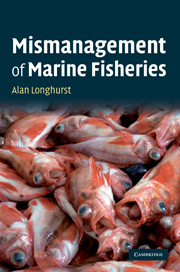Book contents
- Frontmatter
- Contents
- Preface
- 1 From certainty to doubt in fishery science
- 2 The ecological consequences of the exceptional fecundity of teleosts
- 3 Indeterminate growth, negative senescence and longevity
- 4 Marine ecosystems: their structure and simulation
- 5 The natural variability of fish populations and fisheries
- 6 Has sustainability in fishing ever been achieved?
- 7 What is the real state of global fish populations?
- 8 The mechanics of population collapse
- 9 Why don't some fish populations recover after depletion?
- 10 Is the response of the fishery science community appropriate?
- 11 Conclusion: sustainability can be achieved rarely and only under special conditions
- Index
6 - Has sustainability in fishing ever been achieved?
Published online by Cambridge University Press: 05 July 2014
- Frontmatter
- Contents
- Preface
- 1 From certainty to doubt in fishery science
- 2 The ecological consequences of the exceptional fecundity of teleosts
- 3 Indeterminate growth, negative senescence and longevity
- 4 Marine ecosystems: their structure and simulation
- 5 The natural variability of fish populations and fisheries
- 6 Has sustainability in fishing ever been achieved?
- 7 What is the real state of global fish populations?
- 8 The mechanics of population collapse
- 9 Why don't some fish populations recover after depletion?
- 10 Is the response of the fishery science community appropriate?
- 11 Conclusion: sustainability can be achieved rarely and only under special conditions
- Index
Summary
‘Among the ancients, the accipenser was esteemed the most noble fish of all. At the present day, however, it is held in no esteem, which I am the more surprised at, it being so very rarely found.’
Pliny, Natural History 9, 27Before discussing what we know, or think we know, about the present state of fish populations globally, it may be useful to enquire whether fishing was sustainable at the subsistence level of early coastal societies. It is generally reported that fish populations are everywhere failing to maintain themselves, but is this a novel situation? To what extent did earlier societies, having much narrower horizons than ours, perceive that they had exhausted or depleted the fish populations to which their techniques gave them access? What is the response to subsistence fishing of a previously unfished population in a pristine ocean?
Answers to such questions may give us a better understanding of our present situation. This enquiry will lead us back in time to some consideration of the earliest fisheries and the consequences of the progressive evolution of fishing methods in local fisheries, and the spread of these methods to other seas. What follows is heavily biased towards the evolution of fisheries in the North Atlantic, but I believe that this region will serve very well as a general model for what happened in other seas. Because the response of fish populations to periodic environmental change was discussed in the previous chapter, this aspect of the problems of sustainable fishing will not be discussed again here, but it is the background against which all the other processes take place.
- Type
- Chapter
- Information
- Mismanagement of Marine Fisheries , pp. 119 - 154Publisher: Cambridge University PressPrint publication year: 2010



